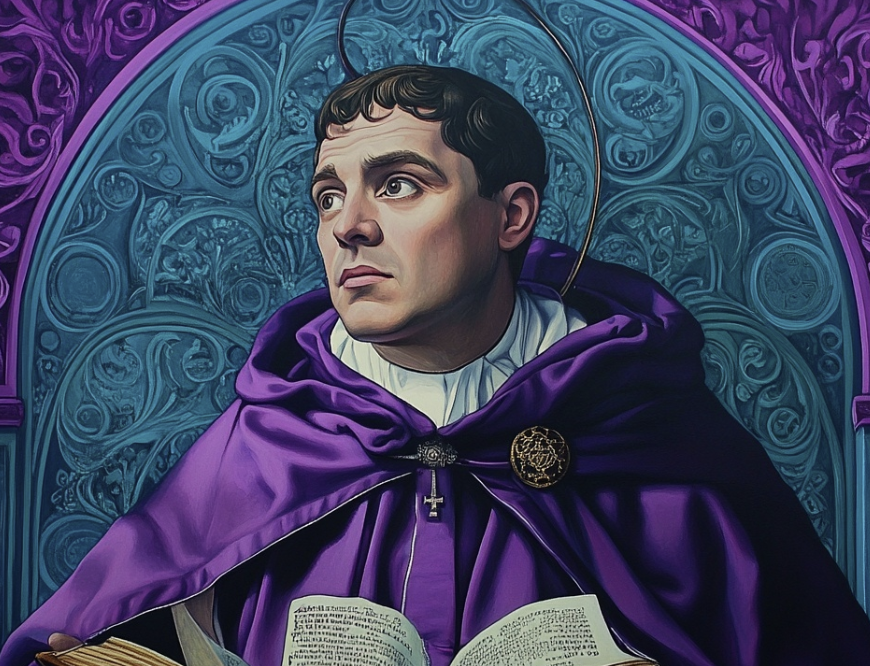
Thomas Aquinas — The Angelic Doctor and Architect of Scholastic Synthesis (1225–1274)
A towering mind of medieval Europe who united faith and reason, reshaped Christian theology, and built one of the most influential philosophical systems in history.
A Quiet Genius in a Tumultuous Age
Thomas Aquinas was born into a noble family near Aquino in Italy, a region marked by political tensions and intense intellectual change. His family expected him to pursue a prestigious ecclesiastical career, but Aquinas chose instead to join the new Dominican Order — a decision so disliked that his brothers reportedly detained him in the family castle to change his mind.
Once free, Aquinas studied in Paris and Cologne under Albert the Great, one of the most learned figures of the era. Despite his imposing stature and quiet demeanor, Thomas’ brilliance soon became undeniable. Students and fellow scholars recognized a mind capable of extraordinary clarity, comprehensiveness, and precision.
“Whatever is received is received according to the mode of the receiver.”
Faith and Reason — Partners in Truth
Aquinas devoted his life to showing that faith and reason are not rivals but complementary paths toward the same truth. Drawing deeply from Aristotle, he argued that human reason can discover the structure of the natural world, while revelation discloses truths that lie beyond reason’s reach.
His method — dialectical, precise, and systematic — became the foundation of Scholasticism. He organized questions, objections, and solutions with a clarity that set the standard for medieval learning and continues to influence philosophical writing to this day.
“To one who has faith, no explanation is necessary; to one without faith, no explanation is possible.”
Natural Theology and the Existence of God
Aquinas offered some of the most influential philosophical arguments for the existence of God, known collectively as the Five Ways. These arguments reason from features of the world — motion, causation, contingency, degrees of perfection, and teleology — to a Necessary, Unmoved, Intelligent source.
He did not intend these as mathematical proofs but as rational pathways pointing toward the ultimate ground of being. His approach shaped centuries of philosophical theology and remains a cornerstone of the discipline.
“The existence of God can be proved in five ways.”
Human Nature, Ethics, and Happiness
Central to Aquinas’ philosophy is the idea that human beings are rational creatures oriented toward the good. Happiness, he argued, is not a fleeting emotional state but the fulfillment of the soul’s deepest capacities. This fulfillment ultimately lies in the vision of God — but natural virtues such as justice, courage, and prudence guide us along the way.
His ethical theory blends Aristotelian virtue ethics with Christian theology, creating a framework that influenced moral thought for centuries and continues to shape contemporary discussions of natural law.
“To love is to will the good of the other.”
A Life of Study, Teaching, and Contemplation
Aquinas wrote at a pace and scale rarely matched in intellectual history. His major works include the Summa Theologiae, Summa Contra Gentiles, extensive biblical commentaries, and detailed studies of Aristotle. His mind worked with serene discipline, constantly organizing, comparing, and refining.
Late in life, he experienced a mystical vision so overwhelming that he stopped writing altogether, saying that everything he had written seemed like “straw” compared to what he had glimpsed. Shortly afterward, he died at the age of 49 while traveling to the Council of Lyon.
“The end of all human action is the vision of the divine essence.”
Legacy
Aquinas’ synthesis of Aristotle, Christian theology, and medieval scholarship became the backbone of Western intellectual tradition. His ideas shaped Catholic doctrine, influenced Protestant reformers, and provided later philosophers with tools for metaphysics, ethics, natural law, and epistemology.
His work stands as a monument to the belief that reason and faith can illuminate one another — and that the search for truth is a unified, noble, and never-ending endeavor.
“Truth is the conformity of the intellect to reality.”
CivilSimian.com created by AxiomaticPanic, CivilSimian, Kalokagathia
